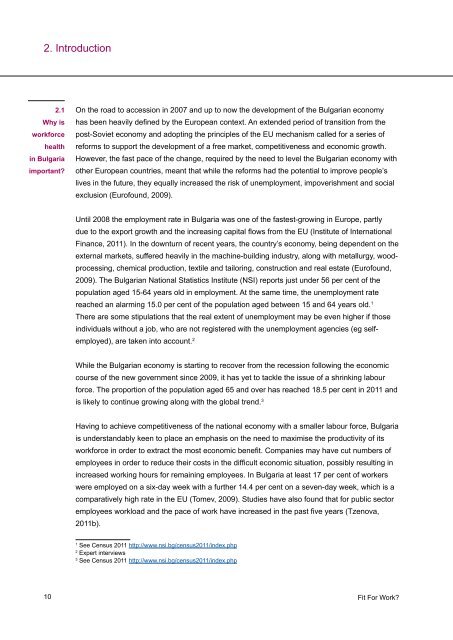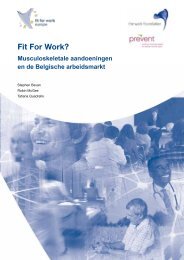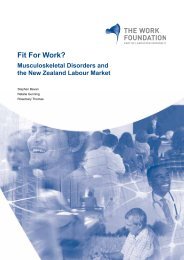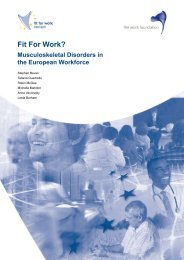FfW Bulgarian report (English language) - Fit for Work Europe
FfW Bulgarian report (English language) - Fit for Work Europe
FfW Bulgarian report (English language) - Fit for Work Europe
Create successful ePaper yourself
Turn your PDF publications into a flip-book with our unique Google optimized e-Paper software.
2. Introduction<br />
2.1<br />
Why is<br />
work<strong>for</strong>ce<br />
health<br />
in Bulgaria<br />
important?<br />
10<br />
On the road to accession in 2007 and up to now the development of the <strong>Bulgarian</strong> economy<br />
has been heavily defined by the <strong>Europe</strong>an context. An extended period of transition from the<br />
post-Soviet economy and adopting the principles of the EU mechanism called <strong>for</strong> a series of<br />
re<strong>for</strong>ms to support the development of a free market, competitiveness and economic growth.<br />
However, the fast pace of the change, required by the need to level the <strong>Bulgarian</strong> economy with<br />
other <strong>Europe</strong>an countries, meant that while the re<strong>for</strong>ms had the potential to improve people’s<br />
lives in the future, they equally increased the risk of unemployment, impoverishment and social<br />
exclusion (Eurofound, 2009).<br />
Until 2008 the employment rate in Bulgaria was one of the fastest-growing in <strong>Europe</strong>, partly<br />
due to the export growth and the increasing capital flows from the EU (Institute of International<br />
Finance, 2011). In the downturn of recent years, the country’s economy, being dependent on the<br />
external markets, suffered heavily in the machine-building industry, along with metallurgy, woodprocessing,<br />
chemical production, textile and tailoring, construction and real estate (Eurofound,<br />
2009). The <strong>Bulgarian</strong> National Statistics Institute (NSI) <strong>report</strong>s just under 56 per cent of the<br />
population aged 15-64 years old in employment. At the same time, the unemployment rate<br />
reached an alarming 15.0 per cent of the population aged between 15 and 64 years old. 1<br />
There are some stipulations that the real extent of unemployment may be even higher if those<br />
individuals without a job, who are not registered with the unemployment agencies (eg selfemployed),<br />
are taken into account. 2<br />
While the <strong>Bulgarian</strong> economy is starting to recover from the recession following the economic<br />
course of the new government since 2009, it has yet to tackle the issue of a shrinking labour<br />
<strong>for</strong>ce. The proportion of the population aged 65 and over has reached 18.5 per cent in 2011 and<br />
is likely to continue growing along with the global trend. 3<br />
Having to achieve competitiveness of the national economy with a smaller labour <strong>for</strong>ce, Bulgaria<br />
is understandably keen to place an emphasis on the need to maximise the productivity of its<br />
work<strong>for</strong>ce in order to extract the most economic benefit. Companies may have cut numbers of<br />
employees in order to reduce their costs in the difficult economic situation, possibly resulting in<br />
increased working hours <strong>for</strong> remaining employees. In Bulgaria at least 17 per cent of workers<br />
were employed on a six-day week with a further 14.4 per cent on a seven-day week, which is a<br />
comparatively high rate in the EU (Tomev, 2009). Studies have also found that <strong>for</strong> public sector<br />
employees workload and the pace of work have increased in the past five years (Tzenova,<br />
2011b).<br />
1 See Census 2011 http://www.nsi.bg/census2011/index.php<br />
2 Expert interviews<br />
3 See Census 2011 http://www.nsi.bg/census2011/index.php<br />
<strong>Fit</strong> For <strong>Work</strong>?







